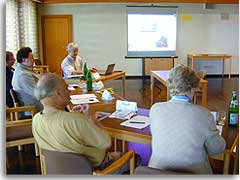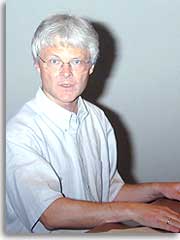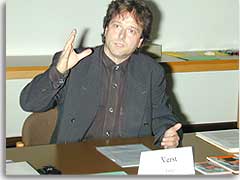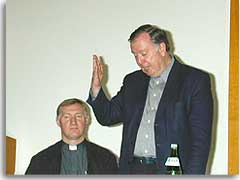 |
| Die Pädagogische Tagung zum Thema "Neue Medien in Erziehung und Seelsorge" fand statt im Priesterhaus Berg Moriah. |
 |
| Tagungsreferent: Hans-Joachim Ludwig, Münster Projekt IT-Schule St. Mauritz |
 |
| Ludger Verst, Katholisches Medienbüro Hamm |
 |
| Tagungsleitung: Pater Dr. Lothar Penners (r) und Pater Ludwig Güthlein |
 |
| Öffentliche Podiumsdiskussion am Ende der Tagung mit Hans-Joachim Ludwig, Münster, Ludger Verst, Hamm (l), Kornelia Fischer, PressOffice Schönstatt (r), Moderation: P. LudwigGüthlein, Schönstatt (m) |
| Fotos: PressOffice Schönstatt, hbre © 2001 |
(mkf) The impact of the new media for pastoral and pedagogy in the Information Age was the subject of this year's Pedagogical Workshop held in Schoenstatt, May 24 - 27, 2001. On the background of fears on the one side and the call for the use of the internet for online evangelization on the other side, the requirement of formation and education of strong personalities able to make their own decisions became obvious – as Schoenstatt's "domain" from the beginning. The bottom line of the discussion was the challenge of managing the turn from reacting to acting.
Fr. Ludwig Güthlein summarized the main items of the first days of the workshop at the beginning of the panel discussion on Saturday afternoon, the central part of the workshop, with a bigger audience and range of participants. The sessions of the two previous days dealt mainly with the implications for school and teaching. Hans-Joachim Ludwig, Münster, who holds a masters degree in mathematics and teaches at a Catholic school, had shown in his presentation that the not-so-new "new media" are not based somewhere in outer space but in the center of everyday school reality – thus being part of the pedagogical task and ist Christian features.
Church Public Relations as service and testimony
Church PR is in the center of Christian faith, is part of the proclamation of the good news and the misisonary task given to each Christian, said Deacon Ludger Verst. Starting from central issues of religious communication sciences, Ludger Verst (Interfaith Communications, Kassel) enfolded basic perspectives of a theology of media communications in the fabric of evangelization and community building, illustrating the theoretical implications with practical experiences from his work in the Catholic Media Office in a Northern Germany city (Hamm). Internal and external Public Relations being equally important, Verst made clear that this work can be seen in the context of "diakonia" (service) and "martyria" (testimony). For example, working for participation of all in the process of communication within the church, making sure that none is left in the dark without knowing what is going on, means a real service of Christian love.
Sr. Kornelia Fischer, in charge of Press Office Schoenstatt, noted that only a few days before this workshop the Extraordinary Consistory of the Cardinals had worked on the subject of the new evangelization through the modern communication technology in order to share and spread the faith, encouraging clergy, seminarians, religious, and laity to take the opportunities offered by internet for online evangelization – a claim that was also emphasized by the Asian Bishops Conferences (FABC) at their meeting May 7 –12, 2001.
Experiences from the two years of providing a regularly updated web site and of the communication and sharing created through e-mails and internet, she said, would show that contacts created through the new techniques do not need to be – as feared by many – superficial, impersonal and causing a loss of social contacts. They can and do provide growth in and increase of mutual openness, communicability, interest, mission consciousness and pride in one's own talents because one can share them, knowing that they are important and will be appreciated by others.
Information, the Key Resource
Information being the key resource and the method of accessing and filtering the flood of information being the key qualification of the future generation, "information and media formation" is crucial and should be seen as the key task for schools, said Hans-Joachim Ludwig during the panel discussion, summarizing again the opportunities and challenges of the "entrance" of the new technologies into the schools - the widening of the horizon, the international aspect, the working against a knowledge gap and the changing of work style providing opportunities, would not mean to ignore the dreaded costs, the data trash, the "powerpointization of thinking and the loss of unmediated communications.
Offensive Method: Setting Themes instead of Following the Themes Set by Others
The global net is a reality, and the information or knowledge age has begun, whether school, church, Ecclesial Movement, or any individual wants this or not. Church PR, and generally the church's relationship with the media, neglected for years although highlighted and recommended by Vatican II and especially through "Communio et Progressio," would have to be given more attention, said Ludger Verst. Instead of complaining about the bad media coverage of church themes and allowing others to dictate on the themes (by simply reacting in a defensive way), the church, dioceses, Ecclesial Movements, etc. should take the opportunity to set the themes (agenda setting). The last Consistory has especially recognized communications as a major challenge for the new millennium, within the church and from the church. Media communication, and as part of this "cyber-communication," can create, as intended by Communio et Progressio, solidarization, democratization of communication and open missionary communication from the very areas of lived faith. Sr.Kornelia Fischer underlined these statements given by Ludger Verst from her experience with the web site and the impact of the existence of a Press Office; the new media can open new frontiers of spreading Schoenstatt and spreading faith.
Social Communications Formation and Education
It is not the paper on which the news is printed that is good or bad but
the news itself – and this is made and published and read (or not) by human beings. It's not about the newspaper, but about who is behind the newspapers and who reads them. Thus, it is not about the chances and challenges of the media, but about the formation and education of persons who use the media passively or actively. "Are we able and mature enough to make proper use of the enormous advancements of our age in all the exterior realms?" A key question - a question to be found in the Pre-Founding Document of October 27, 1912; Father Kentenich continues after listing the dreads: "So, let us return to the Middle Ages, tear up the railroad tracks, cut the telegraph lines, leave the electricity to the clouds, return the coal to the earth, and close the universities! No, never. We do not want that, we may not and we cannot do that." Father Kentenich took the advancements in the technical and scientific realms as a challenge for self-education and formation, said Sr. Kornelia, and this would be the challenge imposed on us at the dawn of the information age. The workshop was too short to cover all aspects of the subject. A discussion has been initiated that might continue – why not via the new means of communication (for example with experiences and comments shared via 'Schoenstatt Meeting' ) To share and spread the faith in a quick and uncomplicated way, said Ludger Verst, for this goal Christians could and should also use the new media – the media that, in the official statements of the church, would be called "instruments of social communications," instruments also for the spread of the Good News.
English edition: Joan Biemert, New Franken, WI, USA